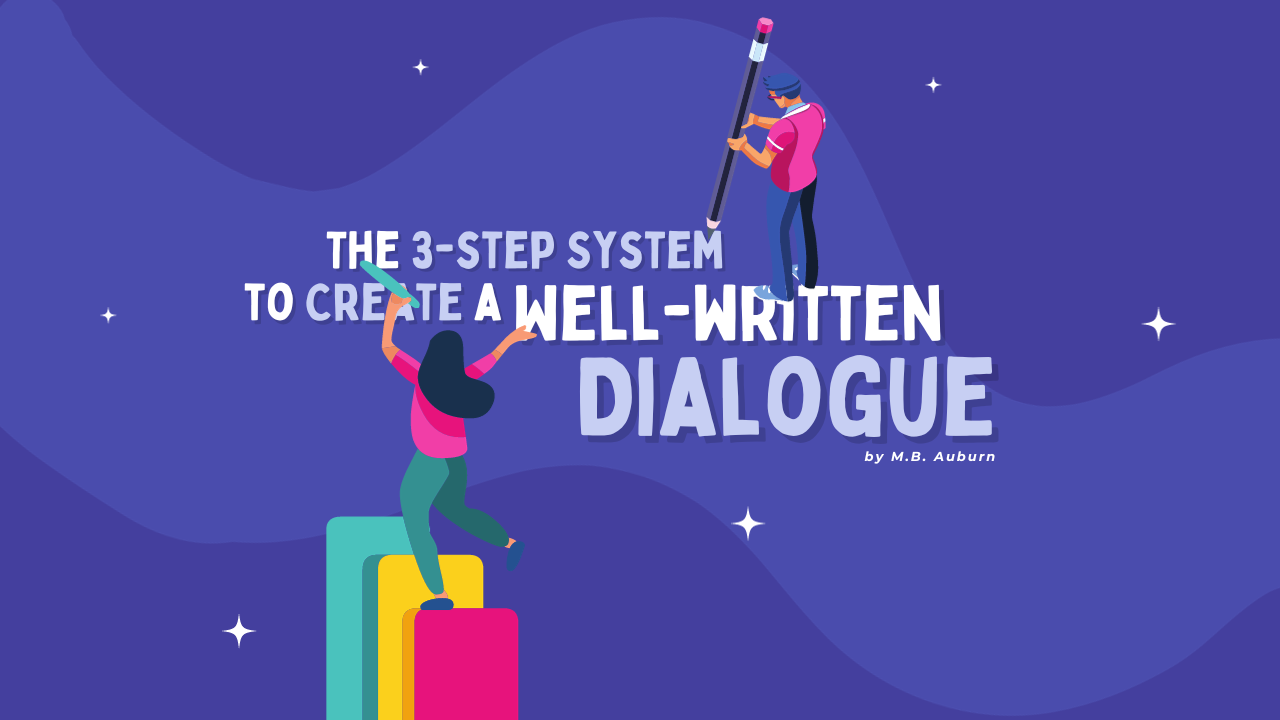
Whether you’re stuck on a scene in your novel, or you just want to get some writing training in, I’m glad you’re here, Writer.
Dialogue can be a tricky thing. Voice, tone, natural flow, relationships, information from one character to another (or innuendos from the author to the reader) and many more; all of these must be carefully interwoven to create a literary treat of a scene. Nothing can be left to chance - every word has its weight and as the author and creator of your characters you must know just how heavy or light the spoken lines should be. I’m not gonna lie to you and say „no pressure.” With dialogue there most definitely is pressure.
However! I am here to offer assistance in a time of need.
I will show you how I break down the process of writing dialogue so that I can cover all bases.
3 steps to follow in order to create a good dialogue
To take this journey with you, I also created a dialogue using this process. For the purposes of this article, I will use the characters of Katniss and Peeta from Susan Collins’ The Hunger Games. Let’s get to it!
1. Stating the obvious
I’m going to let you in on a little secret I learned: if you start from something simple, you can work your way up.
Nobody likes to read basic dialogue. But the basic messages are the key points of the story!
I mean, imagine frivolously drawn up lines, with all the tones, and voices, and visual descriptions, but the point of the scene is nowhere to be found. And if the plot went MIA, then who cares how many intricate words you used?
To make sure you don’t lose sight of the reason for the dialogue, start by stating the obvious in the conversation. Answer the questions:
- Where are we?
- Who likes who?
- What is the relationship between the characters?
- Are there any secrets?
- What are the messages the characters have to share?
- What is the problem?
- Why are we here?
- How do your characters feel? Etc.
Once you have all these questions answered, put them in the mouths of your characters. No fluff, editing, nada. Create the most basic form of dialogue you can where nobody hides anything and everything is out in the open. It’ll be a terrible script, but it will make clear the messages that need to be understandable to the reader.
Let’s bring Katniss and Peeta to the stage to show you what I mean.
Katniss: Hi. We’re in the underground district 13. I worry about you. You look terrible.
Peeta: Yes. I’m terrified and depressed. Can’t swallow a thing, if i don’t die in the war fighting I’m going to starve. Also, I’m scared of your ex - is he your ex?
Katniss: I don’t know. I think he’s cute, but then you’re also cute and so kind and this whole being stuck together thing makes me like you more.
Peeta: I can’t believe you like me. I love you. Secretly. I would totally die for you even though you like the other guy too. Is the friendzone gonna be forever?
Katniss: Oh wow. Thanks. Um, let’s see if we can survive this first, mkay? I’m gonna run away now.
If you’re not cringing, you did it wrong. This is exactly what we want at this stage.
2. Covering the obvious with meaningful phrases
In this step, we hide the obvious messages with less obvious phrases related to the story. In your mind, the minds of your characters, and in the world of your story, what says things like:
- I worry about you,
- I’m nervous,
- I need you,
- Is there something I could do for you?
- I’m confused,
- I’m totally pining for you.
In my head, it’s pretty simple stuff. Maybe…
…making sure someone had a warm meal?
…asking them about their loved one?
…saying a sincere "thank you” for something specific?
…blurting out something a little too much?
…coming up with an excuse to leave?
Whatever your ideas, use them as covers for the basic messages. Here’s how I did it:
Katniss: Did you um… did you get something to eat?
Peeta: Yeah, I did. Eating anything besides berries is… I’m sorry, I didn’t mean to bring it up like that…
Katniss: No, it’s okay. I can’t stop thinking about that, either.
*silence*
Peeta: Is Gale doing alright?
Katniss: He’ll be fine. This whole rebellion, he was made for it.
Peeta: *silence*
Katniss: Thank you for coming last night. The nightmare… It’s good to have you near.
Peeta: I’ll always be here.
*Katniss silence*
Katniss: I’m going to see what Haymitch wants. He said something was urgent. I’ll see you at supper.
Okay, not perfect, but good enough to add the third layer: narration.
3. Adding narrative flair
This is the part where you want to show the scene to the reader.
It’s a layered task, so not everything at once. As you work, you change and move things around - nothing is in stone here, even from the previous points.
To give this step more structure, I broke it down into smaller tasks.
a) Start with the setting
This might be one of the questions that was not so easily covered in step 2. I mean, why would a character say “Here we are, district 13!” So, add a sentence or two describing the setting. Do you see it? Think of it like a movie: you are the director and you get to decide where to do a close up, what sounds or visuals to focus on. Temperature, light, texture, color or lack of; all this is yours to decide on.
b) Add some "he said, she said"
You can’t go wrong with those, especially in the first draft of your dialogue.
ALSO: In fervent defense of said
Related terms are also good. Maybe it is important to underline that a character shouted or whispered a line?
c) Feelings
Think about what your characters feel: fear, thirst, desire?
Add that in. Of course, in most cases, it is better to say “His stomach grumbled” instead of “he was hungry,” for example. However, this is the first draft, so you can once again state the obvious, and work on covering that later.
d) Movements and actions
Finish up by adding props, gestures, verbs, etc. Should your character hold a weapon? Or nervously play with their fingers? What would you do in their situation?
Editing and polishing your dialogue
Once you do all that, you can pat yourself on the back and take a break. We have ourselves the first draft of the dialogue-focused scene.
From this point on, you read it a few (hundred) times, delete, add, substitute, etc. At any time, you can state the obvious for the sake of moving on, and work on transforming it later. The 3 step system can be applied to any part of dialogue building.
This is how my first draft turned out:
Katniss walked the long, dim hallway. Through groups of people passing her by, she saw Peeta and walked towards him. He noticed her and right away made his way to meet her.
- Did you um… did you get something to eat? - she asked.
- Yeah, I did. - he smiled faintly. - Anything besides berries is good… I’m sorry, I didn’t mean to bring it up like that…
- No, it’s okay. I can’t stop thinking about it, either.
Her glance traveled across his face, noting every sign of weariness: the heavy eyelids, sunken cheeks, lips lacking color…
He could sense her studying him. Straightening up and looking her straight in the eye, he asked:
- Is Gale doing alright?
- He’ll be fine. This whole rebellion, he was made for it.
Katniss wished he wouldn’t have asked about Gale. The way he desired all of District 1 to anguish frightened her.
- Thank you for coming last night, - she blurted out. - The nightmare… It’s good to have you near.
A burning sensation took over Peeta’s chest. Gently, he reached for her hand, barely touching her fingers.
- I’ll always be here, - he said.
For a moment, everything was blurry. Katniss let Peeta’s fingers linger on hers a little. Then she brought her hand to her ear to brush back her hair - but it was already tied up.
- I’m going to see what Haymitch wants. He said something was urgent. I’ll see you at supper.
Aw, Katniss. Left him hanging like that, tsk, tsk, tsk.
Of course, this isn’t the only way to write dialogue, but it certainly works for me. I do hope you will give it a try, Writer. Just remember:
- State the obvious
- Cover it
- Add narrative flair
Now I can say “no pressure” - just baby steps.
I believe in you, Writer.
M.B. Auburn
M. B. Auburn
Written for The Plottery
M.B. Auburn: millennial wife and mom of 2, dancing her way through her 30s and finally bravely claiming the title: Writer.










